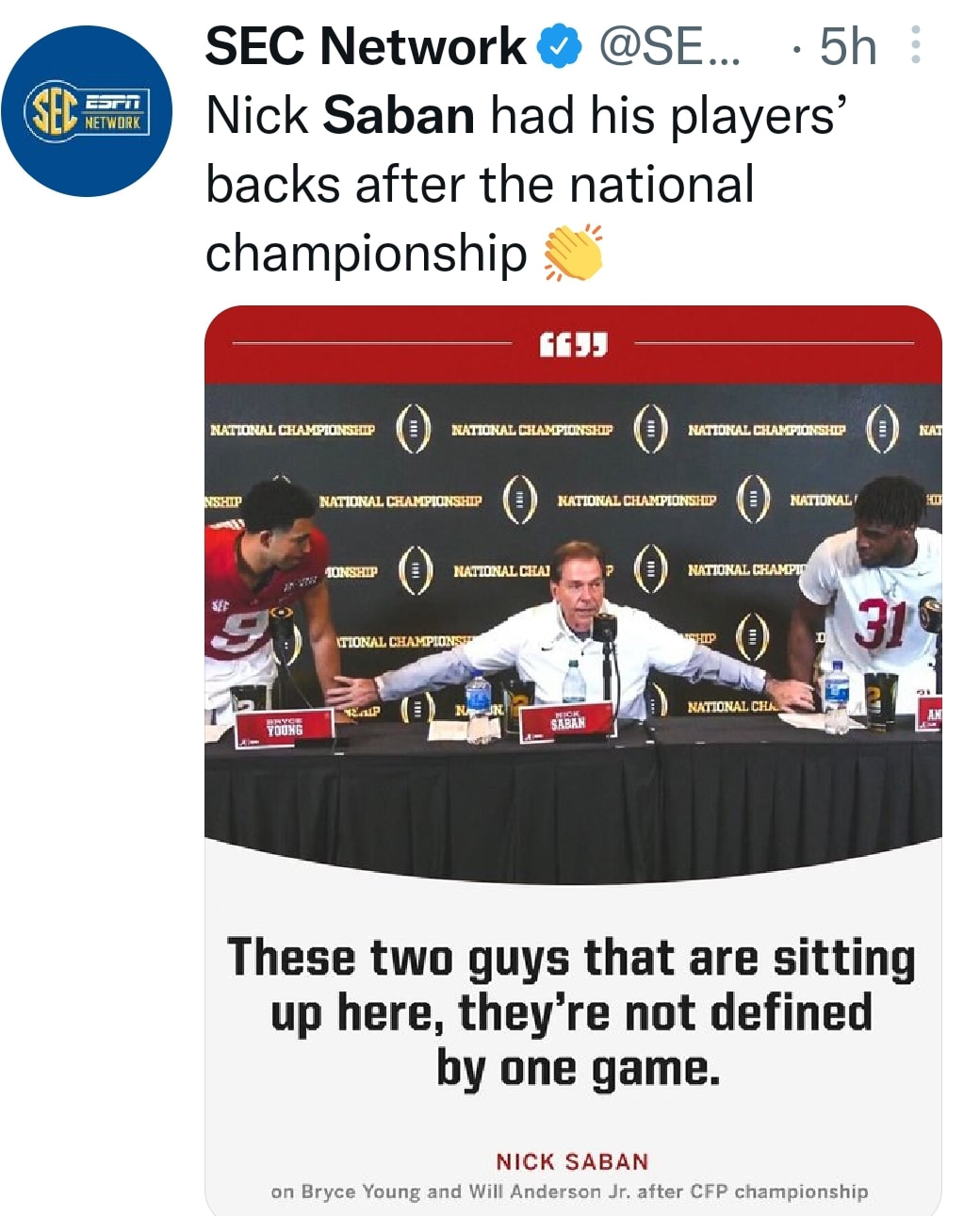Any loss is difficult for the ultra-competitive Nick Saban, head coach of Alabama football, who many consider the best college football coach of all-time. But a loss in the national championship game is most painful for someone whose singular goal is winning the national championship.
For 15 years at Alabama, and at LSU and Michigan State before, he has led programs to sustained success including a remarkable seven national championships. Despite unparalleled success, he is never complacent, turning the page on the last championship to focus on the season ahead. That competitiveness is embedded in the culture of his program.
For 15 years at Alabama, and at LSU and Michigan State before, he has led programs to sustained success including a remarkable seven national championships. Despite unparalleled success, he is never complacent, turning the page on the last championship to focus on the season ahead. That competitiveness is embedded in the culture of his program.
After last night’s loss to Georgia in the national championship game, he showed another important side of what makes him one of the best leaders of his profession and why businesses and other organizations use him as a model for leadership.
His Heisman Trophy-winning quarterback Bryce Young and all-America defensive lineman Will Anderson, Jr. just finished their part of the post-game news conference and were clearly despondent. Saban reached his hands out to both players as they rose to leave and asked the media if he can say something about them. He emphasized that game alone doesn’t define the identity of the two stars and talked about how hard they had worked along with the rest of the team. He made sure the two players understood what their hard work and effort meant to him, despite the loss.
That type of compassion, blended with competitiveness, is what makes the ultimate leader. Such leaders want success for more than just themselves. They want it for the team or organization, and for others beyond the team, company or organization. Saban’s success deeply touches not only his team, but the University of Alabama, many in the state of Alabama, and others globally who find happiness in the success of the University of Alabama brand.
The same can be said for other individuals, businesses or organizations that have a highly competitive mindset and culture to achieve high-level success. When that competitiveness and resulting success is coupled with compassion, the result is not only a better business or organization, but better communities and a better world.
Microsoft Chairman Bill Gates is equally as competitive as Saban and that drive has fueled decades of profitability for the company and enriched Gates. Yet, Gates and his ex-wife Melinda have used billions of those dollars to help impoverished people globally with healthcare, hunger and opportunities to lift themselves up.
Competitiveness blended with compassion is the best way to change the world. Success that is selfless begets more success.
His Heisman Trophy-winning quarterback Bryce Young and all-America defensive lineman Will Anderson, Jr. just finished their part of the post-game news conference and were clearly despondent. Saban reached his hands out to both players as they rose to leave and asked the media if he can say something about them. He emphasized that game alone doesn’t define the identity of the two stars and talked about how hard they had worked along with the rest of the team. He made sure the two players understood what their hard work and effort meant to him, despite the loss.
That type of compassion, blended with competitiveness, is what makes the ultimate leader. Such leaders want success for more than just themselves. They want it for the team or organization, and for others beyond the team, company or organization. Saban’s success deeply touches not only his team, but the University of Alabama, many in the state of Alabama, and others globally who find happiness in the success of the University of Alabama brand.
The same can be said for other individuals, businesses or organizations that have a highly competitive mindset and culture to achieve high-level success. When that competitiveness and resulting success is coupled with compassion, the result is not only a better business or organization, but better communities and a better world.
Microsoft Chairman Bill Gates is equally as competitive as Saban and that drive has fueled decades of profitability for the company and enriched Gates. Yet, Gates and his ex-wife Melinda have used billions of those dollars to help impoverished people globally with healthcare, hunger and opportunities to lift themselves up.
Competitiveness blended with compassion is the best way to change the world. Success that is selfless begets more success.

